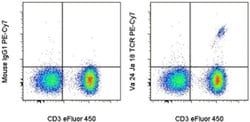Learn More
Invitrogen™ TCR V alpha 24 J alpha 18 Monoclonal Antibody (6B11), PE-Cyanine7, eBioscience™
Mouse Monoclonal Antibody
$405.00
Specifications
| Antigen | TCR V alpha 24 J alpha 18 |
|---|---|
| Clone | 6B11 |
| Concentration | 5 μL/Test |
| Content And Storage | 4°C, store in dark, DO NOT FREEZE! |
| Applications | Flow Cytometry |
| Catalog Number | Mfr. No. | Quantity | Price | Quantity & Availability | |||||
|---|---|---|---|---|---|---|---|---|---|
| Catalog Number | Mfr. No. | Quantity | Price | Quantity & Availability | |||||
50-112-3387

|
Invitrogen™
25580642 |
100 Tests |
Each of 1 for $405.00
|

|
|||||
Description
Description: The 6B11 monoclonal antibody reacts with an epitope of the CDR3 formed by the germ-line configuration of the V alpha 24 and J alpha 18 of the TCR alpha locus, which results in the expression of an invariant T-cell receptor (TCR) expressed by invariant NK T cells (iNKT). This TCR is homologous to the murine V alpha 14J alpha 18. This TCR alpha chain pairs with a restricted set of rearranged TCR beta chains, with V beta 11 being the most prominent in humans. NK T cells are restricted by the CD1d molecule and are activated by a CD1d-presented glycolipid ligand, which results in the rapid production of IL-4, IL-13 and IFN gamma. Although iNKT cells have NK-like cytolytic activity, they are considered regulators of immune responses because they rapidly produce large amounts of both Th1 and Th2 cytokines in autoimmune disease, infectious disease, and cancer. The number of iNKT cells present in peripheral blood of normal humans shows considerable variability ranging from 0.01-1% of total peripheral T cells. Applications Reported: This 6B11 antibody has been reported for use in flow cytometric analysis. Applications Tested: This 6B11 antibody has been pre-titrated and tested by flow cytometric analysis of normal human peripheral blood cells. This can be used at 5 μL (0.25 μg) per test. A test is defined as the amount (μg) of antibody that will stain a cell sample in a final volume of 100 μL. Cell number should be determined empirically but can range from 1...
The ability of T cell receptors (TCR) to discriminate foreign from self-peptides presented by major histocompatibility complex (MHC) class II molecules is essential for an effective adaptive immune response. TCR recognition of self-peptides has been linked to autoimmune disease. Mutant self-peptides have been associated with tumors. Engagement of TCRs by a family of bacterial toxins know as superantigens has been responsible for toxic shock syndrome. Autoantibodies to V beta segments of T cell receptors have been isolated from patients with rheumatoid arthritis (RA) and systemic lupus erythematosus (SLE). The autoantibodies block TH1-mediated inflammatory autodestructive reactions and are believed to be a method by which the immune system compensates for disease. Most human T cells express the TCR alpha-beta and either CD4 or CD8 molecule (single positive, SP). A small number of T cells lack both CD4 and CD8 (double negative, DN). Increased percentages of alpha-beta DN T cells have been identified in some autoimmune and immunodeficiency disorders. Gamma-delta T cells are primarily found within the epithelium. They show less TCR diversity and recognize antigens differently than alpha-beta T cells. Subsets of gamma-delta T cells have shown antitumor and immunoregulatory activity.Specifications
| TCR V alpha 24 J alpha 18 | |
| 5 μL/Test | |
| Flow Cytometry | |
| PE-Cyanine7 | |
| Mouse | |
| RUO | |
| PBS with BSA and 0.09% sodium azide; pH 7.2 | |
| Primary | |
| Affinity chromatography |
| 6B11 | |
| 4°C, store in dark, DO NOT FREEZE! | |
| Monoclonal | |
| Liquid | |
| IgG1 κ | |
| Human | |
| Va24; Valpha24 | |
| Antibody |
The Fisher Scientific Encompass Program offers items which are not part of our distribution portfolio. These products typically do not have pictures or detailed descriptions. However, we are committed to improving your shopping experience. Please use the form below to provide feedback related to the content on this product.
